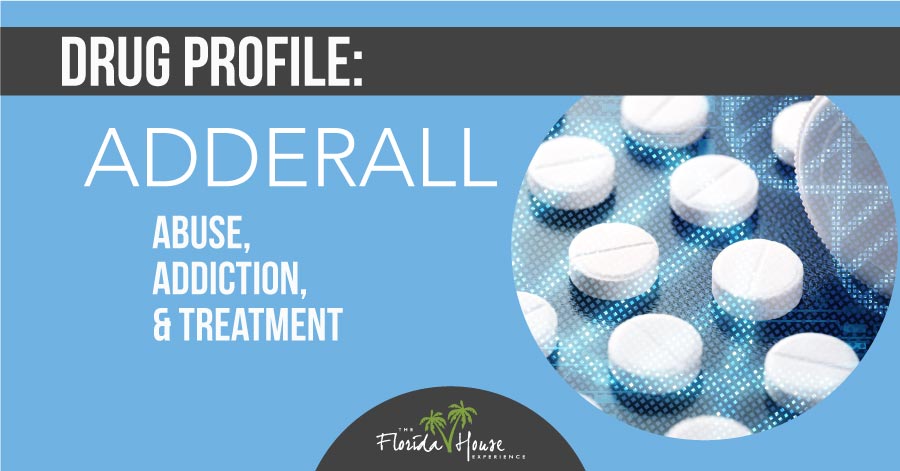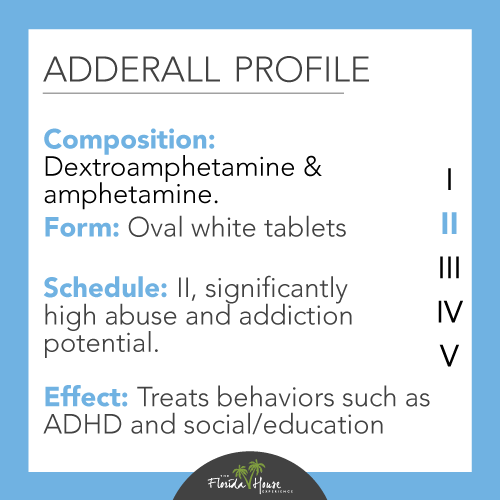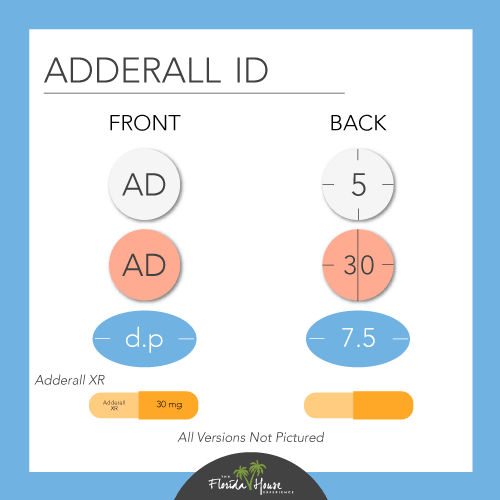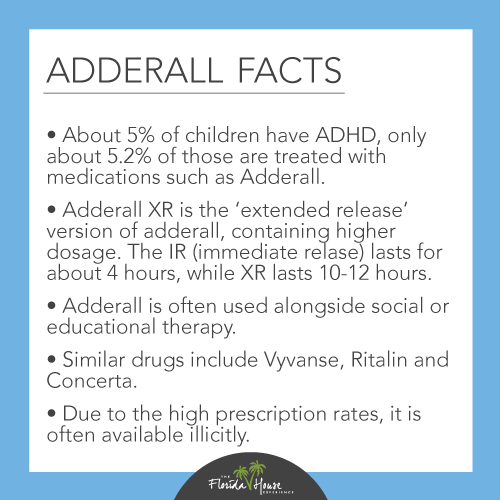
Adderall is one of the most misunderstood and complex types of drugs today. It has numerous beneficial uses and, when used in the right people and in the right way, it can help to restore a healthy balance to life. It’s hard to see this when the drug is one commonly spoken about in a negative light. Celebrities such as Justin Bieber and Jessica Simpson have reportedly used it for positive results. On the other hand, there are numerous stories of those who abuse it in an attempt to improve their functionality and reaction times.
At FHE Health, Adderall is a drug commonly seen in those who abuse prescription medications. For others who have a condition warranting use, it can be life-changing. But for those who use it for improper reasons, it can be a highly addictive drug that requires treatment.
What Is Adderall?

Sometimes called the addy drug, Adderall is a medication used to help with conditions such as attention-deficit-hyperactivity disorder (ADHD). The U.S. Centers for Disease Control and Prevention note that about 5 percent of children have ADHD, though many believe this figure is higher due to underdiagnosis. Only about 5.2 percent of children ages 2 to 17 who have the condition use medications like Adderall for treatment.
Adderall and Adderall XR are the brand name for dextroamphetamine and amphetamine, which can be used to treat ADHD as well as narcolepsy. These medications are a type of central nervous system stimulant. When used in a person with ADHD, the medication works to reduce restlessness, helping to improve attention and concentration.
In most situations, Adderall is used alongside other treatment including social and educational therapy. Some patients also benefit from psychological therapy as well. It is only available through a doctor’s prescription after a full evaluation is conducted.
What Does Adderall Do, and Why Is It Important?
 A person taking Adderall should have demonstrated symptoms of ADHD or narcolepsy. Adderall, as well as Vyvanse and Ritalin, work to increase the availability of the brain’s neurotransmitters norepinephrine and dopamine and to mimic the actions of those neurotransmitters. By increasing the presence of those neurotransmitters, it increases clarity and focus, which are controlled by the sympathetic nervous system.
A person taking Adderall should have demonstrated symptoms of ADHD or narcolepsy. Adderall, as well as Vyvanse and Ritalin, work to increase the availability of the brain’s neurotransmitters norepinephrine and dopamine and to mimic the actions of those neurotransmitters. By increasing the presence of those neurotransmitters, it increases clarity and focus, which are controlled by the sympathetic nervous system.
The drug’s chemical makeup taps into the areas of the brain that control impulses and hyperactivity. In doing so, it is possible for the person to experience a better level of focus and concentration. In a person who is struggling to focus on tasks at hand, this type of drug can work to stimulate the necessary areas of the brain, allowing for more control.
If you have ADHD or trouble focusing, the drug can help you to accomplish tasks on time, focus on important topics such as in school or work environments and handle emotional thought patterns.
It’s important to follow only your doctor’s recommendations for taking this drug. Most often, this requires taking the medication from one to three times a day, usually four to six hours apart.
Addiction and Adderall
 How can a drug like this be a problem, then? Adderall only works like this in those who have ADHD symptoms. When taken by people who don’t have those symptoms, it can have the opposite impact, working as a stimulant such as meth does.
How can a drug like this be a problem, then? Adderall only works like this in those who have ADHD symptoms. When taken by people who don’t have those symptoms, it can have the opposite impact, working as a stimulant such as meth does.
Adderall increases the presence of dopamine, which is the body’s feel-good chemical. Because it creates that rewarding effect, it can encourage repeated and, in some cases, abusive use of the drug. Over time, the brain can become dependent on Adderall in order to function properly. Without it, your productivity may be low, and your overall mental clarity will be limited.
Going without Adderall may cause an addicted person to experience withdrawal, feeling mentally tired or foggy. You may also feel unable to get through the day without it.
Common symptoms of Adderall abuse include:
- An Adderall headache or physical pain when you don’t use the drug
- Being unable to cut down on the use of the drug even if you want to do so
- Needing a larger dose to feel the impact
In the long term, overuse of this drug can create a number of complications, interfering with day-to-day responsibilities and relationships. Some people develop a significant need for the drug, putting it before other things that should be important to them.
What are the dangers of using Adderall? In every situation, it’s important to follow your doctor’s prescription for safe use. Overusing the drug can escalate into addiction in many men and women. Long-term abuse of this drug can create worrisome outcomes such as:
- Risks to relationships
- Aggression
- Panic, depression and hallucinations
- Rapid breathing
- Rapid heart rate
- Fever
If overdose occurs, it can cause tremors and seizures. Some people lose consciousness, and there is a risk of sudden death from overdose.
Mixing Alcohol and Adderall
Adderall and alcohol do not mix. This combination can create heart problems and behavioral issues. In some situations, it can cause alcohol poisoning. Some people experience overdose symptoms immediately after taking the combination.
Treatment for Adderall Addiction
Not all people need to go through a detox program for Adderall. Those who have a significant addiction and chemical dependency should be monitored by medical doctors during withdrawal to ensure they are safe. Obtaining treatment for Adderall addiction starts with a full diagnosis and treatment plan individualized for that person.
If you are unable to get through the day without the use of Adderall or any of the drugs like it, or your loved one has become dependent on this drug, it’s time to seek treatment. Like all substance use disorder treatments, a combination of medical and mental health care is beneficial. Individual therapy sessions may be a good starting point for those who have this addiction.
Seeking Help for Adderall Addiction at FHE Health
FHE Health offers treatment to those who have Adderall or other prescription drug addictions. This type of treatment may help individuals regain control over their use. Alternative, nonaddictive drugs may be available for ADHD treatment as well. Contact us to learn more about your options.






